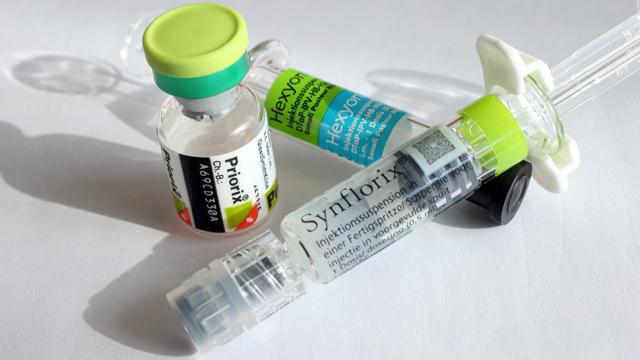Back in January, the Center for Disease Control and Prevention (CDC) announced that it was getting involved with a large outbreak of mumps in Washington state. At the time, it was uncertain if the problem was isolated to the region. It’s now becoming clear that the uptick of infections is occurring across the United States.
[referenced url=”https://gizmodo.com.au/2017/01/a-freak-mumps-outbreak-strikes-washington-state/” thumb=”https://i.kinja-img.com/gawker-media/image/upload/t_ku-large/pmsqg4xevobqx7phu5lc.jpg” title=”A Freak Mumps Outbreak Strikes Washington State” excerpt=”A mumps outbreak in Washington has health officials concerned over how to keep the disease contained. The state reported on Wednesday that there have been 278 confirmed and probable cases of mumps across five different counties since October. Now, the Center for Disease Control and Prevention (CDC) is getting involved to help fight the spread of the contagious disease.”]
Almost every state has at least a couple of cases of the mumps reported to the CDC this year. Arkansas has been hit by more than 300 cases and as of March 4th, there have been 1,242 known cases nationwide.
The figures are disconcerting for the CDC, in part, because it shows that the explosion of infections that occurred in 2016 are continuing into the new year. Fluctuations in the number of infections are common but last year saw the highest rate in a decade with 5,311 incidents reported.
Before the widespread availability of the MMR vaccine (measles, mumps and rubella), around 186,000 cases of mumps were reported each year. Since then, the number has plunged to around 1,000 annual cases. This was in part because of a successful campaign in 1993 to increase awareness of the need for vaccination.
Health researchers aren’t entirely sure what’s to blame for the increasing number of cases. A 2010 study published in the Journal of Infectious Diseases points to possibilities like individual immunity waning and high population density in communal living in some areas. Generally, the disease hits younger people and students the hardest because of its ability to spread in classrooms. But the rise in popularity of a debunked study study that linked autism to vaccines has many fearing that cases are increasing because people are electing to forego vaccination.
The CDC has concluded that vaccinations are safe but celebrities like Jenny McCarthy still insist that they are dangerous despite the overwhelming scientific consensus. That’s not just a problem when it comes to spreading mumps, which is largely non-fatal. The vaccine also covers measles which is deadly and has also seen a rise in cases in the U.S. despite the fact that it is highly preventable.
While overall vaccination rates remain high (around 90 per cent) the problem comes from the fact that outbreaks tend to occur in communities where anti-vaccination sentiments have taken hold. The population in general benefits from “herd-immunity.” The MMR vaccine is not 100% effective but those who aren’t properly immunized tend to be fine because they don’t come in contact with the diseases. That doesn’t work when communities decide they don’t want to vaccinate their children. A 2015 study by Pew Research found that a majority of those who delay or avoid vaccines are white, well-educated and have high incomes. According to the CDC, the majority of cases of measles in the U.S. involved people who had not been vaccinated. This is an especially bothersome problem because as a nation we’d essentially eliminated measles back in 2000.
Camille Sabella, director of Cleveland Clinic Children’s Center for Pediatric Infectious Diseases tells USA Today, “The most important thing is to be sure your child has two dosages of MMR and … common sense things, washing your hands well and trying to stay away from individuals who may be obviously ill, not sharing drinks, cups.”
